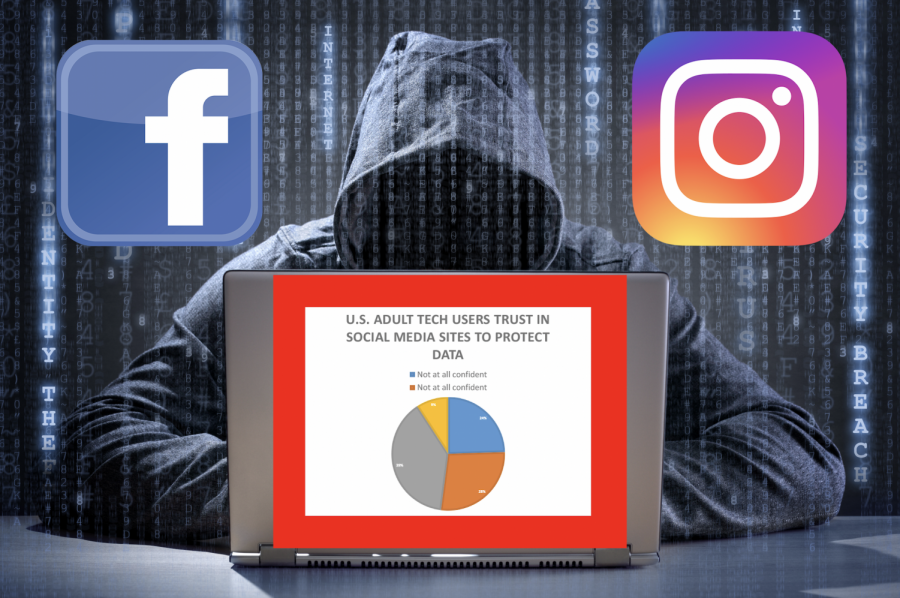The Social Media Information Thief
Corporations accused of stealing users’ personal data
Photo illustration by S. McMeekin
Social media users are often unaware when their personal data is being used by companies to create advertising algorithms.
September 21, 2021
With the growth of social media, the act of companies utilizing personal information in order to sell advertising has become less of a scandal and more of a common occurrence. This phenomenon has been brought to the public eye through documentaries, such as Netflix’s The Social Dilemma, and high-profile lawsuits, including those against TikTok and Facebook. Although this breach of privacy is well known, the number of users continues to increase, showing the strength of society’s dependence on social media.
In order to join the social media network, users trade privacy for relevant feeds and the ability to create online connections. Social media companies generate income by selling advertising space, utilizing a user’s personal information in order to strategically place ads. This entails that the real consumer of social media is advertising companies, with users’ information being the product. However, this exchange of personal information between user and social media platform turns into privacy exploitation when information is taken without consent.
The origin of social media can be traced back to the early 2000s, with the introduction of Facebook in 2004 and Twitter in 2006. The first information stealing scandal occurred soon after. According to NBC News, in 2007, Facebook was charged by the Federal Trade Commission (FTC) over charges that Facebook made private information public without consent of the user. This was the first in a series of Facebook privacy scandals. The largest scandal culminated in February 2021 with a lawsuit against Facebook’s use of photo face-tagging that violated Illinois privacy laws. The case resulted in a $650 million settlement by Facebook.
According to The Guardian, U.S. District Judge James Donato approved the settlement of the Illinois Facebook lawsuit and is happy with the result.
“It will put at least $345 into the hands of every class member interested in being compensated,” Donato said. “This is a major win for consumers in the hotly contested area of digital privacy.”
Downloading the popular app TikTok has been notorious for putting a user’s personal information at risk. This fear was popularized by various corporations restricting employees from downloading TikTok. According to an article from forbes.com, the U.S. military banned TikTok on all government-issued phones, and the company Wells Fargo is known for asking employees to not download the app. These fears stemmed from the suspicion that the Beijing-based company, ByteDance, that owned TikTok, was using data mining to spy on Americans. On Sept. 19, 2021, ByteDance made a deal with U.S. companies Oracle and Walmart, providing more security to American users as the app would not be exclusively Chinese owned.
Social media can be beneficially utilized to increase market reach of a business, stay in touch with distant family or friends, and spread information easily to large amounts of people. These benefits often outweigh the fears of stolen information, as social media has become an integral part of today’s society. Therefore, the solution is not to completely avoid social media, but to reduce risk of personal information stealing. These strategies include not tagging the location of a post, logging out of social media sites when leaving the app or using an internet security software.
Technology coordinator Adam Babcock is familiar with social media information selling.
“The vast majority of users still do not understand how social media, websites and the Internet works,” Babcock said. “Social media are not the only sites tracking you around the Web… Amazon, Google and others track you well after you search for something on their sites. Most people do not know that. Public perception certainly hasn’t slowed sign-ups or subscriptions.”




